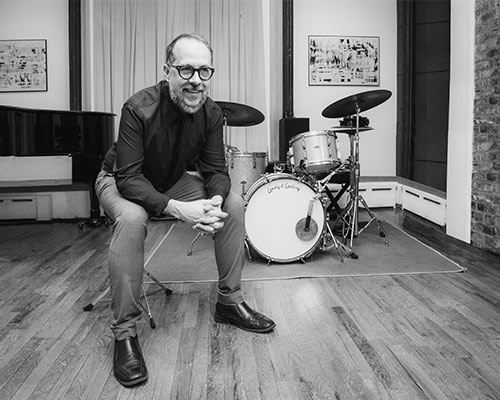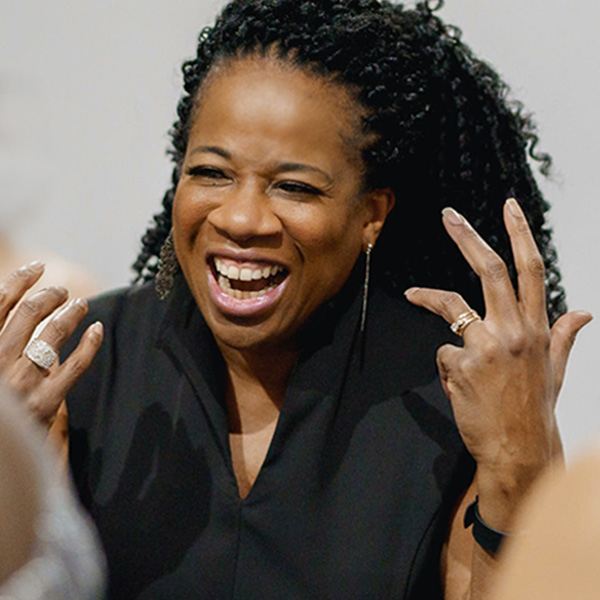Schulich School of Music professors Matt Haimovitz and John Hollenbeck have both been nominated for Grammy Awards before, but this time, with a pandemic looming over proceedings, the glitz and glamour of music’s biggest night has been replaced with a more modest virtual ceremony that took place on March 14. Despite this, the nominations were a welcome acknowledgement following a catastrophic year for the arts.
“We’re rarely part of the main event. We usually have the ceremony for jazz and classical in the afternoon,” says Haimovitz, a cellist who was nominated in the Best Classical Compendium category for his work on Luna Pearl Woolf: Fire and Flood. “But one of my favorite parts of it was just being able to hang out with all these musicians and engineers. The tops in our field.”
Jazz drummer Hollenbeck, who was up for Best Large Jazz Ensemble Album for Songs You Like a Lot, the finale of his acclaimed trilogy of covers, says even without the regular gala a nomination is still exciting.
“It’s always helpful validation,” Hollenbeck says. “You always like to think you’ve made a good record, but when your peers acknowledge it, it’s good news.”

Haimovitz was first nominated in 2010 for Meeting of the Spirits in the Best Classical Crossover category. Throughout his career, Haimovitz has pushed the physical and sonic boundaries of classical music, from performing in unlikely spaces such as the iconic punk rock venue CBGB, to including works by Janáček, Stravinsky, Arcade Fire and Radiohead all on the same album. In the case of Fire and Flood, he takes on re-imagined Leonard Cohen covers arranged by Woolf, the composer whose work is showcased on Fire and Flood (Woolf and Haimovitz are married).
The prolific cellist actually thought he might have been in the running for a Grammy nomination for another project he worked on, mezzo-soprano Jamie Barton’s Unexpected Shadows, and admitted when it wasn’t selected he turned off the Grammy stream, only to be inundated later by congratulatory texts.
But he’s thrilled this personal project with his wife – the album looks back at 25 years of her avant-garde, vocal-led compositions – made the cut. It also features adventurous arrangements of Cohen’s “Everybody Knows” and “Who by Fire.” Haimovitz calls the late Montreal bard “a prophet” for our current times.
“Leonard Cohen has been important to us since we moved to Montreal,” says Haimovitz. “We were even listening to his music in the car when we first drove up there from Massachusetts. And now our girls know all the words to his songs and we live five minutes from his grave.”
As it turned out, Cohen, BA’55, DLitt’92, also received some Grammy recognition this year, earning a posthumous nomination for Best Folk Album for Thanks for the Dance. Another songwriting legend with McGill ties, Burt Bacharach, AMus’48, DMus’72, was up for Best Traditional Pop Vocal Album for Blue Umbrella. Nick Squire, MMus’98, a Grammy winner in the past for his work as a recording engineer, produced Adès Conducts Adès, a Grammy contender this year in the category of Best Classical Compendium.
For Hollenbeck, a Grammy nomination is a feather in the cap for a trilogy of covers albums that have only gained in momentum and critical praise since he began working on them in 2010. His collaborators have remained consistent throughout: Hollenbeck is the composer, arranger and drummer, along with Theo Bleckmann and Kate McGarry on vocals, Gary Versace on piano and The Frankfurt Radio Big Band rounding out the group.
The first album, Songs I Like A Lot, saw Hollenbeck redoing his favourites from his youth, including Glen Campbell’s “Wichita Lineman.” This was followed by Songs We Like A Lot which featured covers picked by his band. His latest recording features songs requested by fans on social media, from a completely scrambled “God Only Knows” to Joni Mitchell and Bee Gees tributes.
This is Hollenbeck’s sixth nomination, and the second for the trilogy: in 2013 he was up for Best Instrumental Arrangement Accompanying Vocalists for “The Moon’s A Harsh Mistress.” Diving into his nostalgia and the nostalgia of others has given Hollenbeck a unique outlook on what it means to cover a classic and make it your own.
“For this album, some of the songs people asked for I’d never even heard before,” Hollenbeck says. “What I learned throughout this process is I don’t necessarily have to like or know a song before going into it. It’s just material you’re working from, and in the end it’s about coming up with what you consider a successful arrangement.”
In any normal year, receiving accolades from your industry peers is appreciated. In 2020, it was a brief moment of normalcy for artists who’ve had their lives upended.
Hollenbeck had performances lined up in New York, Knoxville, Switzerland, Australia, New Zealand, Seattle and a residency in Finland that were all postponed or cancelled. He’s on sabbatical right now, but hasn’t been able to use the time as originally planned.
“I was supposed to go on a music writing retreat in New Mexico,” Hollenbeck says. “It’s hard for musicians right now because it’s important for us to be in different environments in order to be inspired, and it’s difficult to do that safely.”
Haimovitz is diabetic and has been careful about in-person meetings, but the American performed live for Election Day workers in Des Moines, Iowa as part of the Play for the Vote initiative.
“It was great to have a captive audience,” he says. “We had to be neutral, so that part of it was a little hard. It felt very humanizing and it just felt good to be proactive in some way and not just sitting around waiting for results.”
His Schulich classes have also been online. Haimovitz says with recording and overlaying technology constantly improving, Zoom classes in some capacity may be here to stay. Instead of doing makeup classes when he goes on tours, he could just teach a class from his hotel room. Right now, he’s teaching students remotely in Israel, China and the United States, and he’s impressed at how his pupils have remained motivated during a very difficult year.
“It’s heartbreaking what they’ve been put through,” Haimovitz says. “But they’ve risen to the challenge.”


